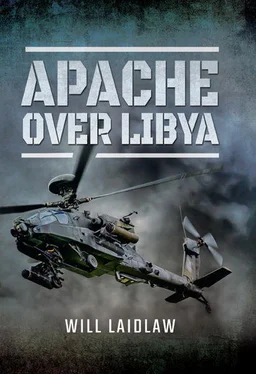Then confirmation, and we shut down communications from the ship. Too much talk might compromise a mission. We had to revert to well managed Royal Navy messaging to families, the ship controlling the message content. Some people grumbled about it, but they weren’t about to fly into Libya. In my last call home in late May I told my wife that we were all good and had everything, that I wasn’t able to speculate, but she should watch the news. I also told her that the Ops Officer at the Regiment would pop round and tell her what he could when he could.
Our families were expecting us home in two weeks; now that wasn’t going to happen. Instead, they got it from Facebook and the news that the summer was cancelled and we were getting involved in some incredibly dangerous conflict. Those meetings in the Community Centre back in April were proving to be important. The Welfare Officer had all the contacts he needed. We made sure he knew how we would contact him, how we would tell him what was going on, but we all knew the first message would be a headline on Sky, ITN or the BBC. He would then have to react. With the ship in a tight communications posture, but with journalists embarked, I knew our families would wake up one morning to worrisome news.
At 1435 hours on Saturday, 28 May the Captain piped the official news to Ocean . Our mission was ‘to provide Attack Helicopter capability and supporting assets to Operation Unified Protector in order to intensify military pressure upon the Gaddafi regime’.
On Ocean speculation was replaced by certainty and preparation for combat. Now embarked with only those who needed to be part of the mission, the 400 or so souls in the ship went into operational mode. This meant ‘Defence Watches’ – a shift system of eight hours on duty and eight hours off, in perpetual rotation. Some departments did six hours on, six hours off. A ship’s company can operate 24 hours a day on this system, fully alert, ready for combat, ready to defend, conduct re-supply, launch and recover aviation. They did this for up to a month at a time, only stopping when the ship came into port. HMS Ocean was about to go to war, again.
Back in the UK, the CO had been rushing between London, Suffolk and Hampshire for over a week, shaping the mission, our way of working and the risk appetite, and thinking about what to do if the worst was to happen. By the time it became clear that he should be with us in the Med he had three hours to get home, pack and be at the airport. Expecting to deploy for a couple of weeks to get everything set up, he packed light and told his wife he’d back in a few days. Lieutenant Colonel John Upton had been in command of a squadron in Afghanistan only a year earlier and been promoted, before a top adviser’s job settled him into his new rank and prepared him for Regimental Command. He had begun his career in tanks, switched to flying and had every operational medal on offer since the early nineties. Approaching forty, he still played competitive rugby and hockey and fancied his chances in the Station triathlon, which was rapidly approaching. An accomplished equestrian in his youth, this tremendous-haired son of a cavalryman Band Sergeant Major demanded accuracy and judgement from his people. He flew out to Cyprus to get on board and be the interface between us in the squadron and the scrutiny of everyone else. In the final reckoning, before each mission was launched, he would be the dispassionate arbiter; the man who talked us through the risk, thought about the alternatives and sold the whole thing back to NATO.
I had only known the CO for a couple of months. He had arrived while I was in Afghanistan, and his predecessor, a staunch supporter of the maritime, was off into the staff machine. Like him, John Upton had an open mind; he was ready to understand and to keep his regiment agile enough to manage its Afghan commitments while having a go at developing this new and unusual opportunity. He was an ideas man and a doer; he got into the detail of our work and made it his place to understand it all.
With John Upton on board in Ocean and Jack Davis heading up the team in the Combined Air Operations Centre (CAOC), we had the dispassionate risk appreciation where it was needed – at the planning place and at the action end. All I had to do was understand the target and fly.
The ranges and the rehearsal exercise were carried out with only a few minor stumbles, not least Reuben and JB effectively denying the rest of us the opportunity to fire. We had tied five floating targets together so that we could keep them all in one place. JB was first up. He arrived on the range, found the targets, actioned a Hellfire and pulled the trigger; it went where he wanted it to go, hitting the middle target, but drove all five to the bottom of the sea. ‘Sorry about that. Do you think it’s good luck?’ was his offer. The rest of us had all fired on the range off Gibraltar earlier in the month. Wings had done what he said he would do – ‘de-risk it for later, in case we don’t get the opportunity again…’
We all fired rockets and 30mm by day and night into the sea and we checked all our chaff and flare dispensers were working. As a method of testing the very perishable skill of unlocking from a radar using chaff and manoeuvre, Mark Hall decided we should fly against the ship’s Phalanx radar. The plan, drawn on a scrap of paper over a cup of tea, was to fly towards the ship, have the Warfare Officer activate the radar, get locked on and evade. We all did it, we all got locked on, we all evaded. This was not just a simple confidence boost; in the coming weeks it could be the difference between crashing and continuing to fight. Gaddafi had radar-guided missiles waiting for us. Within a month our lives would depend on our flying skill and the effectiveness of the Apache defensive systems, as we rushed to unlock from the regime radars before they got missiles in the air.
Then we had the night-flying profile to master. Getting down to 100ft, no lights, formation flying over the sea at the darkest part of the night took nerve. We forced ourselves into this deeply uncomfortable place, certain that trouble would keep the canopy on if we ditched, but knowing that we had to do it if we were to get into Libya and out again. We flew low-level concurrent attack profiles. Targets appeared quickly and disappeared as fast. We manoeuvred hard, bought seconds to think, practise an engagement and duck away again. With just one attempt each at the exercise serials, the pressure was high. I had just two nights to be sure the whole squadron could compete, that it was efficient, agile and safe. At 3.00 a.m. on 29 May 2011, with the last aircraft on deck, crews debriefed and Chris James happy on the phone, I reported to the CO and then to the Commodore that we were good to go. Ocean turned southwest.
At that hour, with the middle watch about to become the morning watch, only those who had to be awake were moving to their duties, or their beds. In the wardroom we broke open the last of the Speckled Hen and wondered if we had done enough to see us through. Nothing in our collective experience of military aviation in combat could give us the assurance we wanted. A new place of danger was waiting somewhere near 32°28′20.65″ North and 14°39′23.18″ East, and Ocean pushed steadily towards our launch. We listened to whoever wanted to play their phone and drank the fridge.
We had four days until the fight started, and we also had half a dozen journalists and their MoD minder onboard. The military has long been wary of the media. Journalists want a front-line interpretation of the political intent. They want to report how politics becomes reality in war. They also want names and faces to give their stories a human touch. We, on the other hand, want to avoid political associations, and instead of telling them whether we will deliver the political results we tell them we are working hard in difficult circumstances but that we will prevail, and so on. They, in turn, are bored by our rehearsed lines. Fighters have forever been confused between what politicians say we do and what we think we do, and we tend to blunder about awkwardly as journalists pick the low-hanging fruit of the military/political communications divide.
Читать дальше












